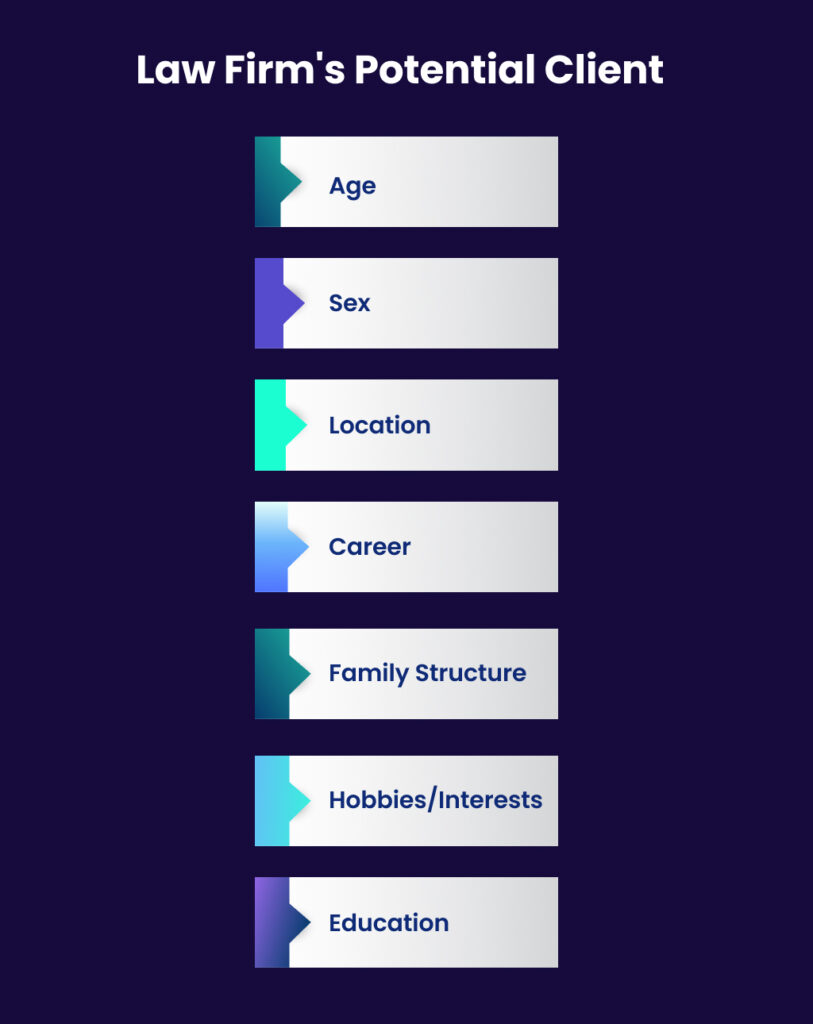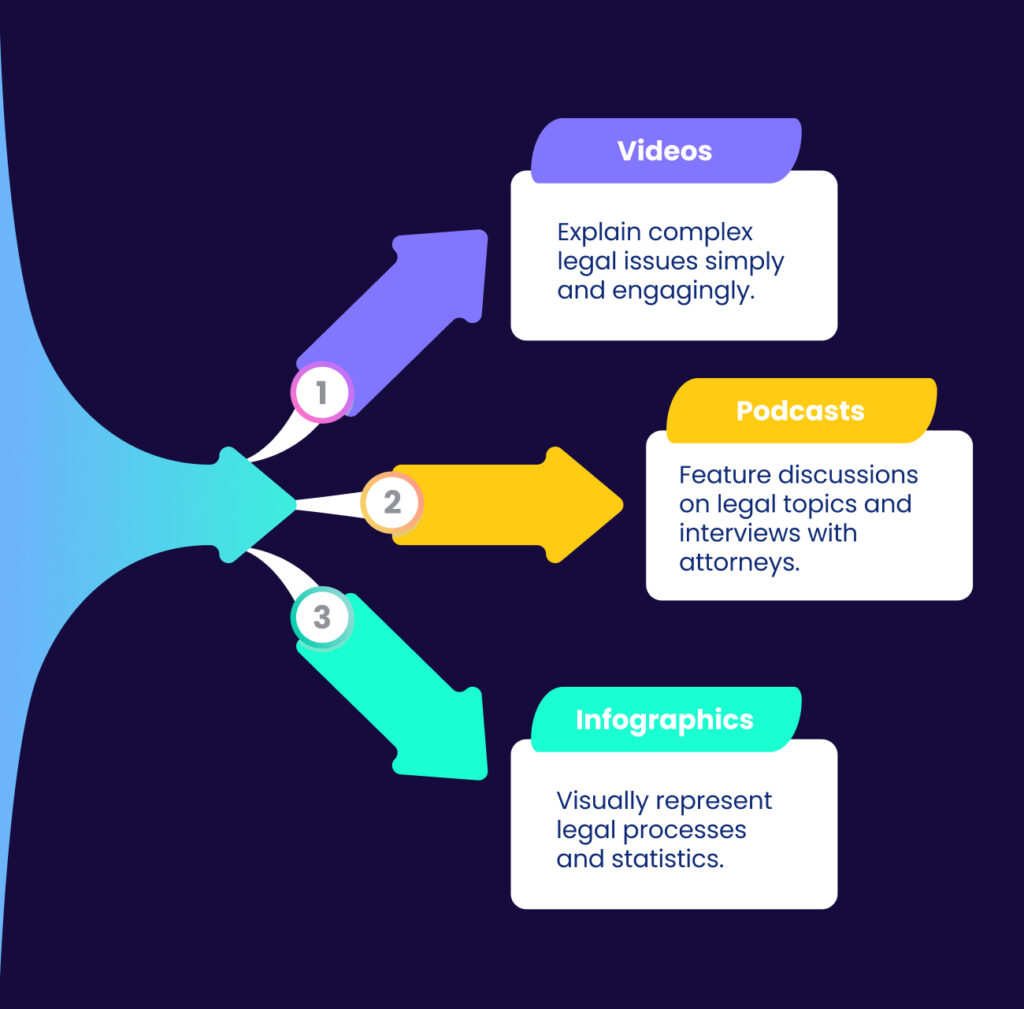How can your law firm stand out in the fiercely competitive legal landscape, where every firm competes with a prospective client’s attention?
The answer lies in content marketing strategies.
According to Statista, the global content marketing industry’s revenue will continue growing over the next few years and will reach 107 billion in 2026.
Source: Statista
In today’s digital age, law firm content marketing has become the essence of any effective marketing strategy, particularly for law firms.
With the legal industry’s competitive nature and the increasing demand for online presence, understanding and implementing a robust content marketing strategy can set a law firm apart from its competitors.
This article explores what marketing for law firms entails, why it’s essential, and how to craft strategies that resonate with your target audience.
What Is Content Marketing for Law Firms?
Law firm content marketing includes creating and spreading valuable, relevant, and consistent content to attract and engage a clearly defined audience—potentially prospective clients.
Source: Statista
Unlike traditional advertising, law firm content marketing provides useful information and builds trust with your audience over time.
Key Components of a Law Firm Content Marketing
- Blog Posts: Regularly updated blogs that cover legal news, tips, and insights help establish a firm as an authority in its field.
- Web Pages: Informative and well-optimized web pages are crucial for ranking in search engines and providing potential clients with the needed information.
- Social Media Posts: Interesting and informative social media posts can extend a firm’s reach and connect with a broader audience.
- Case Studies and White Papers: These showcase the firm’s expertise and success stories, which can be particularly persuasive for potential clients.
- Videos and Podcasts: Multimedia content can explain complex legal issues in an accessible way, catering to different learning preferences.
See also content marketing for startups.
See also healthcare content marketing.
See also content marketing for SaaS.
See also content marketing for ecommerce.
See also content marketing for tech companies.
Why Do You Need a Law Firm Content Marketing
Building Trust and Authority
For many clients, marketing for law firms is often a significant decision during stressful times. Content marketing strategies help build trust and establish the firm as an authority in its practice area.
By consistently providing valuable information, law firms can demonstrate their expertise and reliability, which is crucial for attracting and retaining clients.
Enhancing Online Visibility
A strong online presence is vital in a world where most people turn to search engines for answers.
Content marketing, particularly through law firm seo, helps law firms rank higher in search engine results pages (SERPs). This is the good alternative for SERP marketing. This increased presence makes it easier for prospective clients to find the firm when they need legal assistance.
Engaging and Educating the Audience
Effective content marketing is more than just promotion; it’s about engaging and educating the audience.
By providing content that addresses common legal questions or explains complex issues simply, law firms can engage their audience and position themselves as helpful resources.
Driving Traffic and Generating Leads
High-quality content attracts visitors to a law firm’s website and encourages them to take action, whether signing up for a newsletter, downloading a guide, or scheduling a consultation.
These actions are crucial for lead generation and nurturing prospective clients through decision-making.
Essential Segments of Content Marketing
To make comprehensive and effective content marketing strategies for a law firm, it’s important to focus on several key segments:
1. Content Creation
- Blog Posts: Regularly updating the firm’s blog with informative articles on legal topics, industry news, and firm updates.
- Videos: Creating videos that explain legal processes, showcase client testimonials, or provide insights from attorneys.
- Infographics: Designing visual content that simplifies complex legal concepts or presents data in an easily digestible format.
2. Content Distribution
- Website: Ensuring the firm’s website is a hub for all content, optimized for SEO, and easy to navigate.
- Social Media Platforms: Sharing content across platforms such as LinkedIn, Facebook, Twitter, and Instagram to reach a wider audience.
- Email Newsletters: Sending regular updates to subscribers with links to new content, news, and insights.
3. Content Optimization
- SEO: Implementing SEO best practices to ensure content ranks well in search engines and boosts organic traffic.
- User Experience (UX): Creating the user experience on the website to keep visitors engaged and reduce bounce rates.
- Analytics: Using tools to track content performance and make data-driven decisions to refine the strategy.
Strategies for Effective Law Firm Content Marketing
Understanding Your Target Audience
A clear understanding of the target audience is the core of any successful content marketing strategy. Customer persona is required here.

For law firms, this means knowing their prospective clients’ demographics, needs, and pain points.
Creating detailed client personas can help craft content that speaks directly to these audiences. For example, a personal injury law firm may target individuals who have recently been involved in accidents and seek legal advice.
Crafting a Powerful Content Marketing Funnel for Your Law Firm
Creating a robust content marketing funnel is essential for law firms looking to turn casual website visitors into loyal clients.
The concept of a content marketing funnel revolves around guiding potential clients through a structured journey, from awareness to consideration to decision. At each stage, tailored content plays a pivotal role in nurturing prospects and moving them closer to choosing your legal services.
Source: Growlawfirm
Awareness Stage: At the top of the funnel, the goal is to attract and engage a broad audience. This is where your law firm’s content marketing efforts begin to shine. Create content that addresses common legal questions and concerns, helping prospects identify their issues and realize that they need professional assistance.
Blog posts and informative web pages are excellent tools at this stage. They offer valuable insights and position your firm as a knowledgeable authority in your field.
Consideration Stage: As potential clients move deeper into the funnel, they start to evaluate their options. Your content should aim to build trust and demonstrate your firm’s expertise here.
Case studies, detailed guides, and white papers showcasing your success in similar cases can be particularly persuasive. This content helps to differentiate your firm from competitors and provides prospects with the information they need to consider your services seriously.
Decision Stage: At the core of the funnel, prospects are ready to make a decision. Your content at this stage should encourage them to take the final step and contact your firm.
This is where client testimonials, detailed service descriptions, and clear calls to action on your web pages become crucial. These elements should be designed to alleviate any remaining concerns and prompt immediate action.
Developing a Content Calendar
Consistency is key in content marketing.
Source: LianaTech
Developing a content calendar helps ensure the firm consistently publishes new content across all platforms. This calendar should outline what content will be established, when it will be published, and where it will be shared.
This structured approach helps maintain a steady flow of content that keeps the audience engaged.
Leveraging SEO to Enhance Visibility
Search engine optimization is essential for ensuring that content reaches the intended audience.
This involves optimizing blog posts, web pages, and other content types for relevant keywords and phrases that prospective clients might apply to when searching for legal services.
For instance, keywords like “personal injury leads in Los Angeles” can help a firm rank higher in local search results.
Utilizing Social Media Platforms
Social media is an essential method for law firms, an approach of Law firm content marketing, to connect with their audience, share content, and build their brand. Each platform offers unique opportunities:
- LinkedIn: Ideal for professional networking and disseminating industry insights.
- Facebook: Useful for community engagement and sharing firm updates.
- Twitter: Great for sharing news and quick updates.
- Instagram: Effective for showcasing the firm’s culture and successes through visuals.
Creating Engaging Blog Posts
Blog posts are a cornerstone of law firm content marketing. They provide a platform to delve into various legal topics, share the latest industry news, and offer insights into the firm’s practice areas. Blog posts should be educational, well-researched, and written in a way accessible to non-legal audiences.
Additionally, they should include calls-to-action (CTAs) to guide readers toward taking the next step, whether contacting the firm or subscribing to a newsletter.
Crafting Compelling Case Studies and Testimonials
Case studies and client testimonials are strong tools for showcasing the firm’s expertise and success stories. These pieces of content provide real-world examples of how the firm has helped clients achieve positive outcomes.
They are particularly persuasive because they offer social proof and demonstrate the firm’s ability to handle complex cases.
Embracing Multimedia Content
Different people consume content in different ways. Combining multimedia content such as videos, podcasts, and infographics can help reach a broader audience.

Monitoring and Measuring Content Performance
Monitoring and measuring performance to refine and improve content marketing efforts is crucial.
Applying tools like Google Analytics, law firms can track metrics like website traffic, engagement rates, and conversion rates.
These insights help them understand what content resonates with the audience and where there is room for improvement.
Incorporating Legal Trends and Updates
Staying current with legal trends and updates is essential for creating relevant and timely content. Law firms should regularly publish content that addresses new laws, regulations, and court decisions that influence their practice areas.
This demonstrates the firm’s expertise and keeps the audience informed about important changes.
Building Relationships Through Educational Content
Law Firm content marketing s is not just about promoting services; it’s about building relationships with prospective clients. Providing educational content that helps the audience understand their legal issues and options fosters trust and positions the firm as a valuable resource.
This can include how-to guides, FAQs, and detailed explanations of legal processes.
Partner with [A] Growth Agency for Your Law Firm Industry
Content marketing is not just about making content; it’s about creating the right content that speaks directly to your audience’s needs and challenges. And who can assist in that?
At [A] Growth Agency, we understand the unique challenges and opportunities that law firms face. Our team of marketing professionals is well-experienced in the nuances of the legal industry.
We know that legal clients are often seeking not just services, but trust, clarity, and reassurance. That’s why we focus on creating content that speaks directly to your prospective client’s needs and concerns, establishing your firm as a trusted authority in your field.
[A] Growth Agency can make all the difference. Let us help you!

